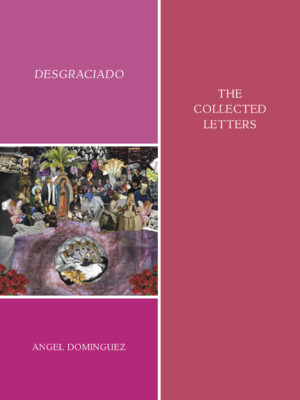Angel Dominguez, a Latinx poet of Yucatec Maya descent, creates a revolutionary reading experience with their work “Desgraciado.” Written as a series of letters to Diego de Landa, a Spanish friar who attempted to destroy the written Maya language in 1562, this collection feels like the ashes of burnt history slipping through generations of fingers, over and over again. Through impassioned insults, declarations of love without forgiveness, and a plethora of heartfelt questions and memories, Dominguez assembles “a living record of the messiness colonialism leaves in its wake.”
The book opens with a Foreword from Raquel Salas Rivera, asking the question of what is needed from the United States and providing the contradictory yet simultaneous answers of nothing and freedom. It discusses the nuances of language, the difference in needing something from someone or somewhere else that has the power to give, versus needing something and viewing its source only as a means to an end or an obstacle. Within the confines of capitalism and colonialism, what can we say truly belongs to us? Is there anything that cannot be taken, by force or by arbitrary disappearance?
Dominguez opens many letters with questions: do you know what it’s like to live as a ghost, which tongue do you use to talk to the dead, do you know what it means to go home or to be beautiful? We cannot expect the long-dead de Landa to respond, yet the inquiries do not feel completely rhetorical. The oppressor’s presence and voice loom loudly on every page. “I can’t quite shake the quiet of my ancestry,” Dominguez writes, dredging up ancient memories of the loss of language – and much more than language.
The word “desgraciado” is literally translated in the foreword as to be disgraced, but more casually means to be despicable. In this work, the desgraciado alternates between the writer of the letters, Dominguez, the intended recipient of the letters, de Landa, and perhaps even the reader of the letters. The boundaries shift in this one-way communication to encompass the flux of conquest and history, falling in and out of God’s grace. These streams of consciousness guide us all through the ache of centuries, navigating the ceaseless cycle of trauma and coping.
Dominguez laments how part of growing up Latinx included “becoming unfamiliar to myself…. Trying to find resemblance in the mouths of my oppressors,” trying to adapt to the assumptions of others but not being proficient in Spanish. What is left of Maya culture seems to be fetishized sex positions, curses, and apocalyptic predictions. Where is everything else? Erased, vanished, or just ignored? How many heavy misunderstandings and microaggressions pile up into a mountain? “I wish the weight of the world’s whiteness on you,” Dominguez writes to de Landa, and perhaps a wider modern audience as well.
With repeated images of fire and ghosts and all the echoes of our colonized world, Dominguez pens the most tender vengeance. “Desgraciado” is an educational epistolary to return to whenever one forgets either how to speak or to listen; it is a unique linguistic treasure. Keep up with Dominguez’s other works, past and future, for there is sure to be more to appreciate.
(Nightboat Books, February 2022)
Bethany Crawford has studied both health science and creative writing, and currently works as a medical scribe in Alabama. She was once the poetry editor of Green Blotter Literary Magazine and read submissions for Spark: A Creative Anthology and Zetetic: A Record of Unusual Inquiry. She rants and shares photos of her ragdoll cats on Twitter @bethanylmary.
